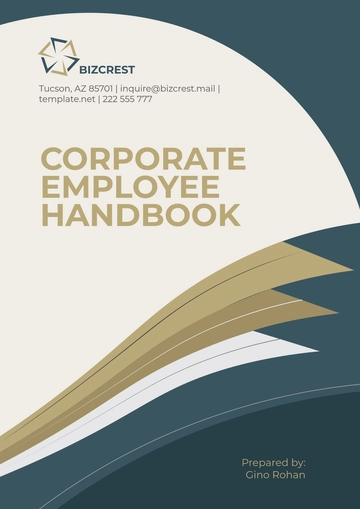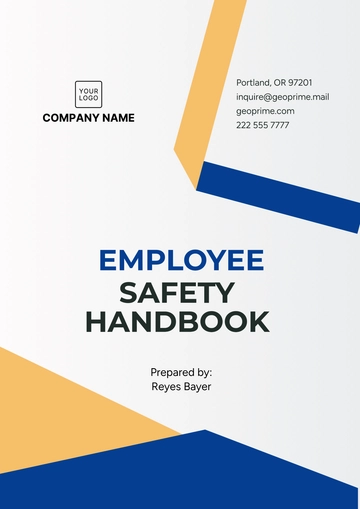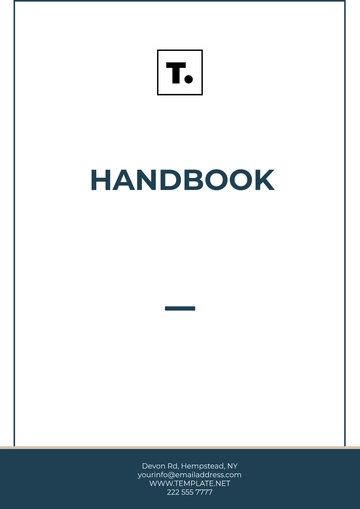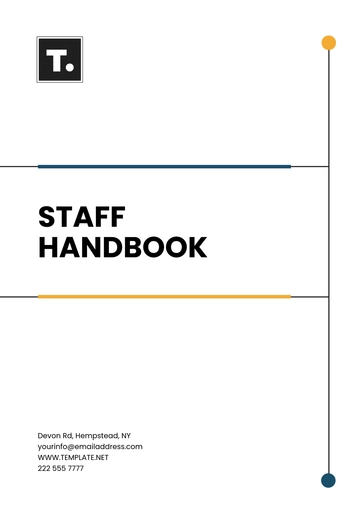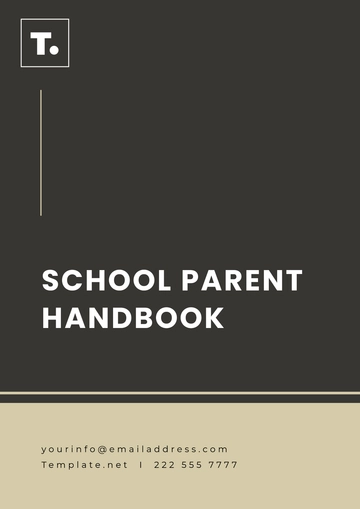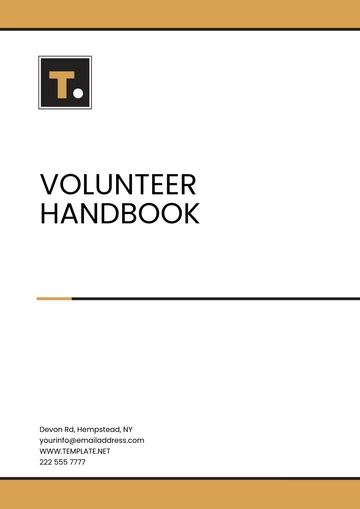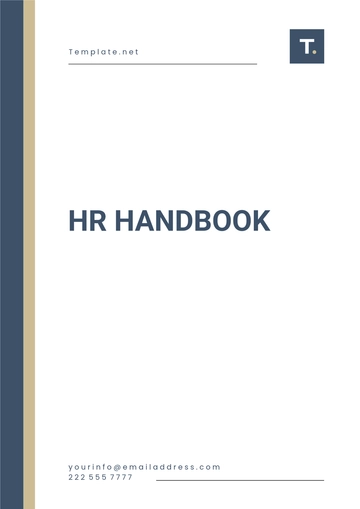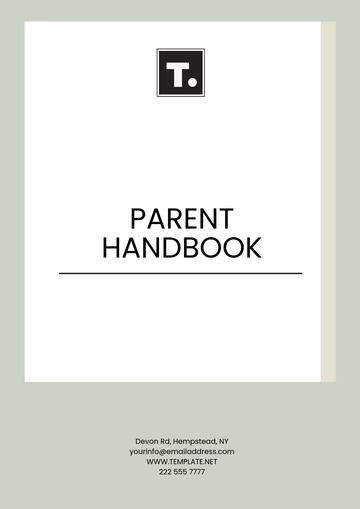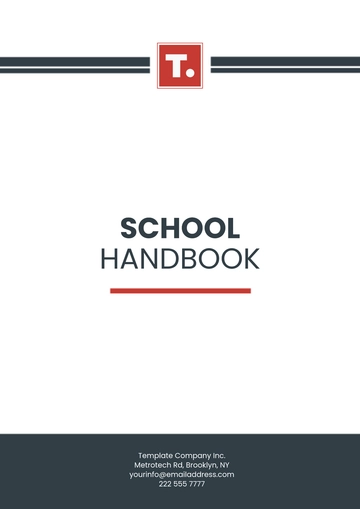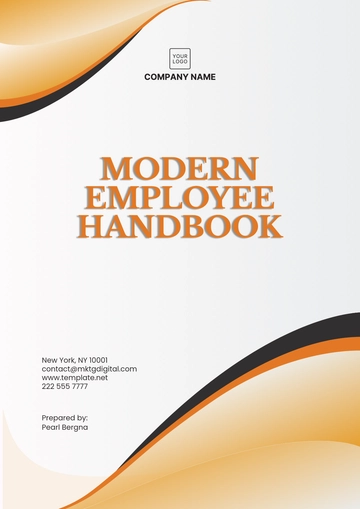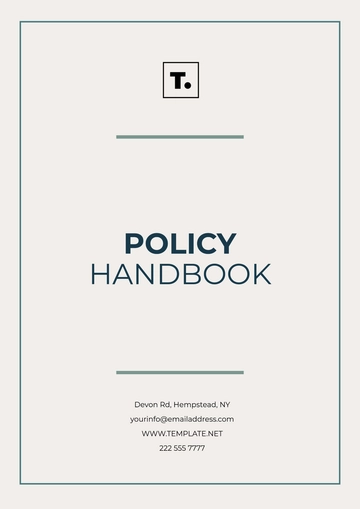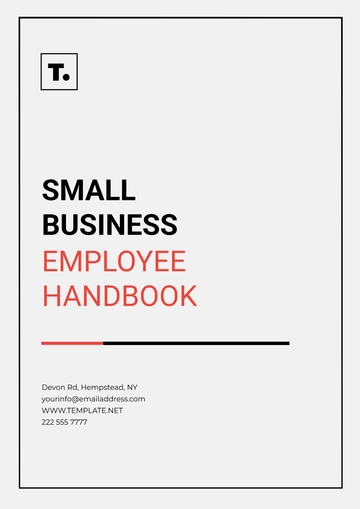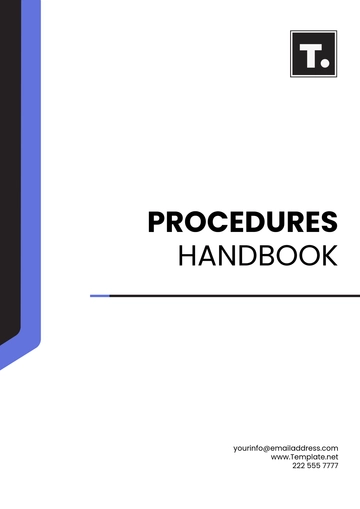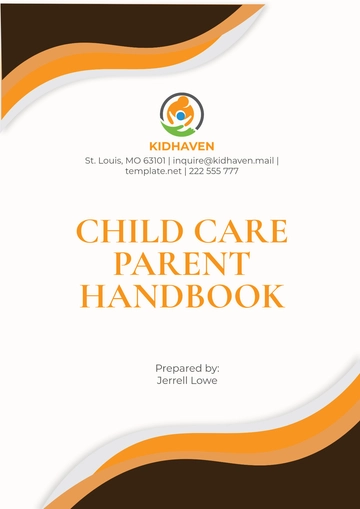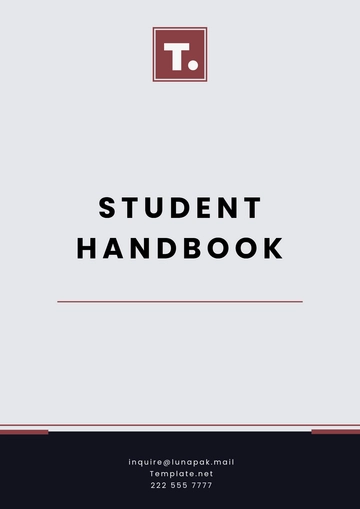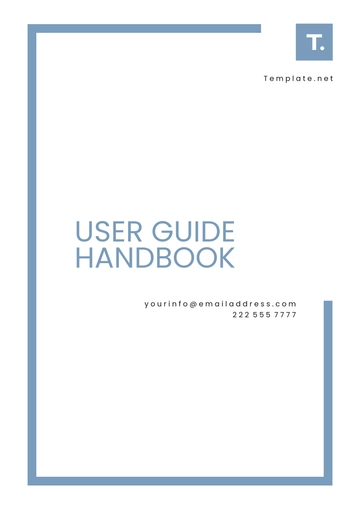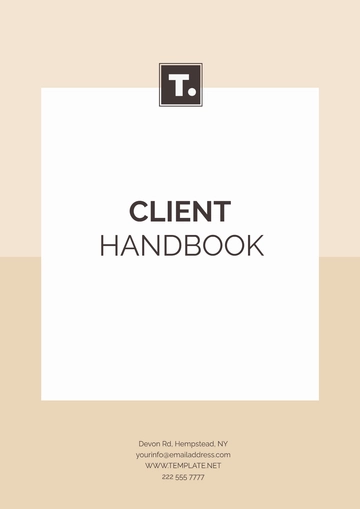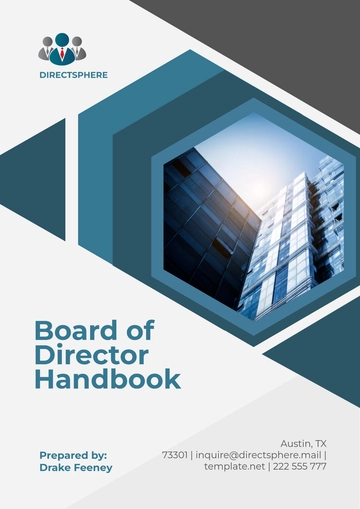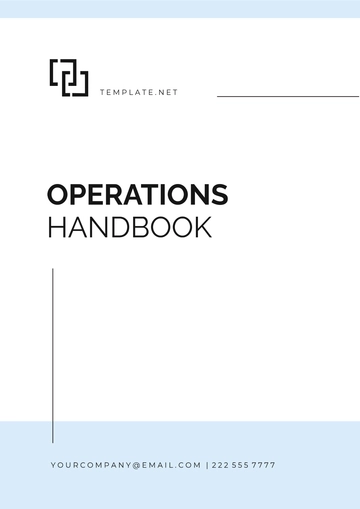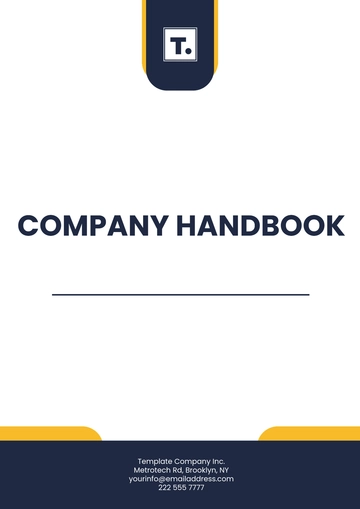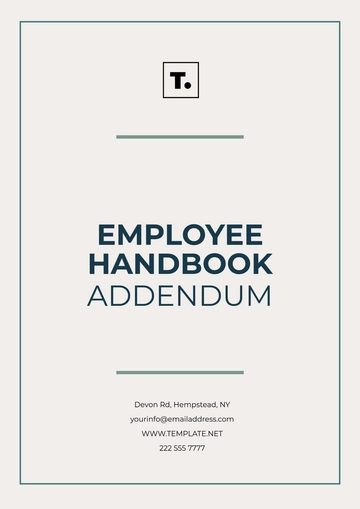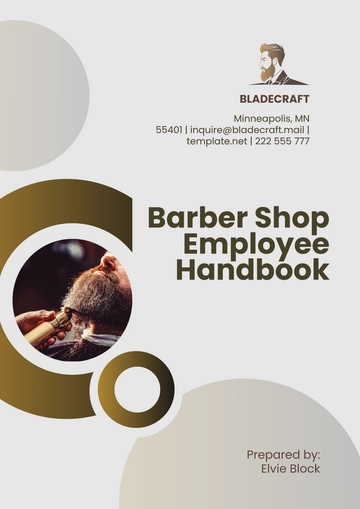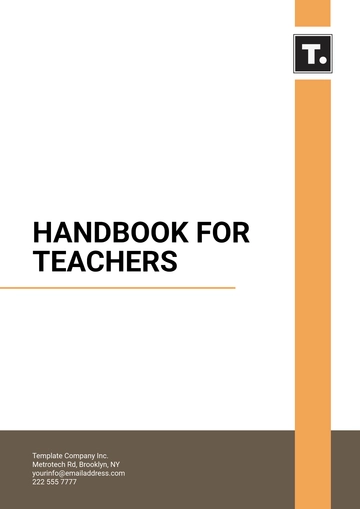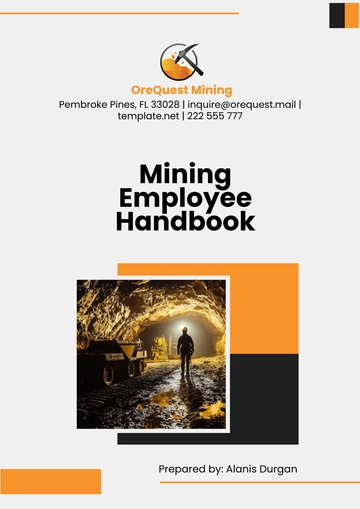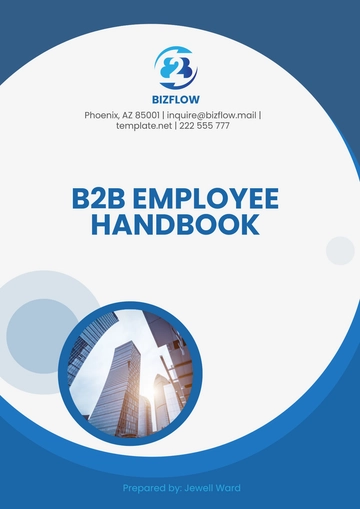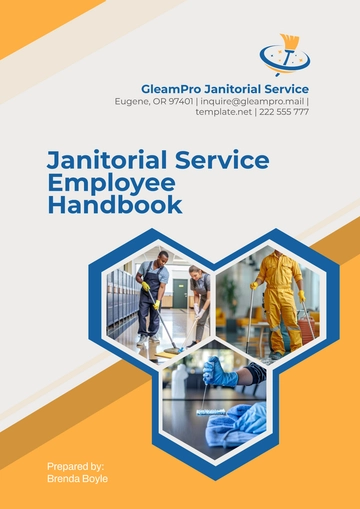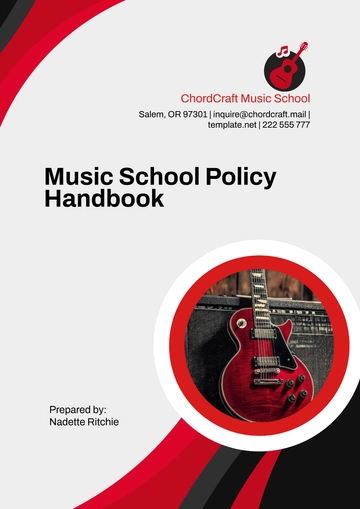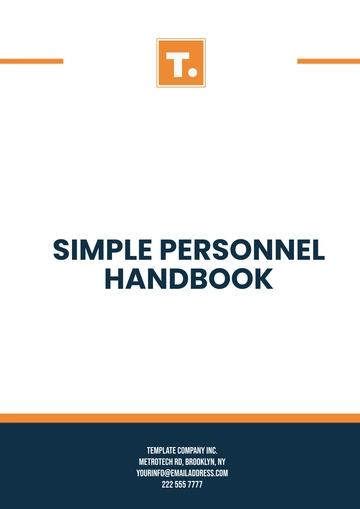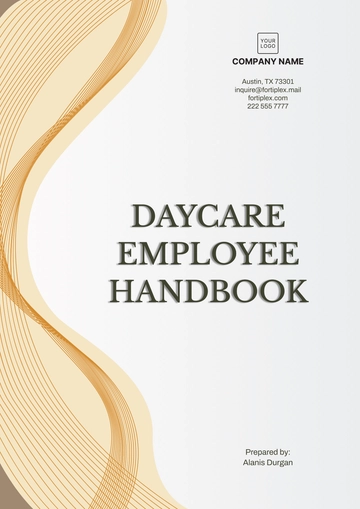Free Music School Policy Handbook
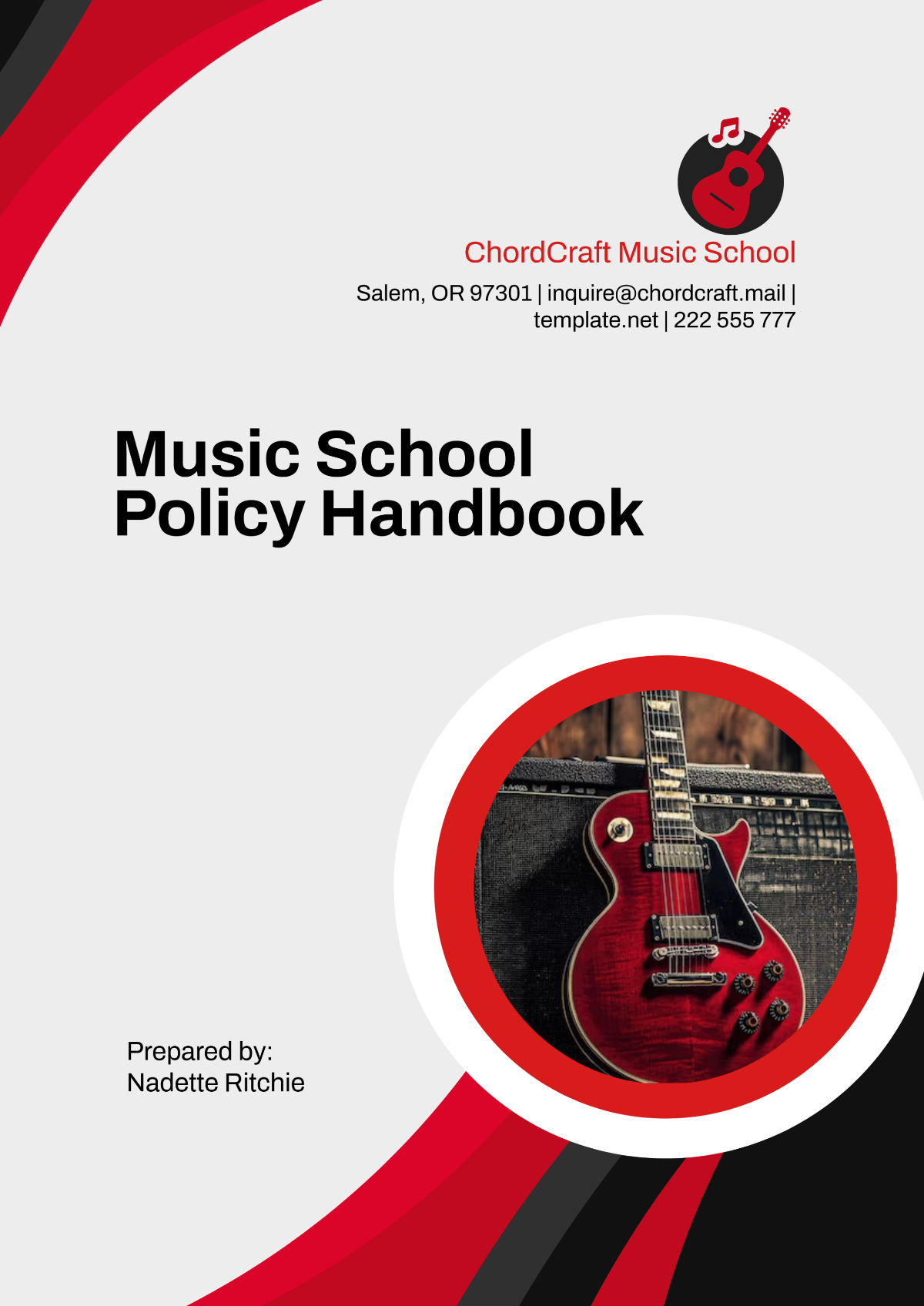
1. Introduction
1.1 Mission Statement
The mission of [Your Company Name] is to foster a passion for music in students of all ages and skill levels. Our school provides a nurturing environment that encourages artistic expression, technical skill development, and a deep appreciation for music. We are committed to promoting the benefits of music education, including critical thinking, creativity, and emotional intelligence, which are vital skills that extend beyond the music studio and into daily life. We aim to prepare students not only for musical excellence but for becoming well-rounded individuals with a lifelong love of learning and the arts.
Our curriculum is designed to be comprehensive, covering various aspects of music education, from theory to performance, in an inclusive environment where every student feels valued. Whether pursuing music as a hobby or aiming for professional aspirations, our mission is to provide the resources and opportunities needed for students to thrive.
1.2 Core Values
At [Your Company Name], we hold ourselves accountable to the following core values:
Excellence: We are dedicated to offering a world-class education in music and continuously strive for the highest standards. Our instructors are highly qualified, passionate about teaching, and committed to helping each student reach their fullest potential.
Integrity: We operate with honesty, transparency, and fairness. We believe in open communication between students, parents, and faculty, creating an environment where trust and respect are paramount.
Community: We believe that music has the power to bring people together, and we work to build a sense of belonging among our students, staff, and the wider community. Collaboration and mutual respect are encouraged in all settings, from group lessons to large performances.
Lifelong Learning: Music is a lifelong pursuit, and we encourage students to develop a passion for continuous learning. We foster an environment where mistakes are viewed as opportunities for growth, and where the learning process itself is just as important as the final achievement.
Our values reflect our commitment to both the musical and personal development of each student, aiming to create not only accomplished musicians but confident individuals prepared for any path they choose to follow.
1.3 Contact Information
For all inquiries, support, or to connect with our team, please feel free to reach out to us using the following contact information:
Address: [Your Company Address]
Phone: [Your Company Number]
Email: [Your Company Email]
Website: [Your Company Website]
Social Media: Follow us on our social media pages at [Your Company Social Media] for the latest updates, events, and community happenings.
Our friendly team is available to assist with enrollment, program inquiries, feedback, and any other needs you may have during your time at [Your Company Name].
2. Enrollment Policies
2.1 Eligibility Requirements
At [Your Company Name], we welcome students of all ages, backgrounds, and experience levels. Whether you're a child interested in your first music lessons, a teenager wanting to refine your skills, or an adult exploring a new hobby, we offer programs suited to all. Our eligibility requirements are flexible and inclusive, and we are happy to accommodate students with varying needs and abilities.
For students under the age of [8], we recommend that a parent or guardian accompanies them during the enrollment process to ensure they have the support they need. We also offer specialized programs and accommodations for students with disabilities, ensuring that all individuals have access to the same opportunities in music education.
Our goal is to make music education accessible and welcoming to all, regardless of prior experience or limitations.
2.2 Registration Process
The registration process at [Your Company Name] is designed to be as simple and user-friendly as possible, to ensure a smooth transition into the program. Here’s a step-by-step breakdown of how it works:
Application Submission: Prospective students must complete an application form available online via [Your Company Website] or in-person at the front office. The form asks for basic information, including personal details, musical interests, and any prior musical experience.
Payment of Registration Fee: A non-refundable registration fee of $[50] is required to confirm your spot in the program. This fee helps cover administrative costs and reserves your place in your selected class or program.
Initial Assessment: For new students, an initial musical assessment is scheduled, allowing instructors to evaluate the student’s current skill level and tailor lessons accordingly. This assessment is designed to ensure students are placed in the most appropriate classes, whether group or private lessons.
Class Assignment: Based on the results of the assessment, students are assigned to a class that best suits their skill level and interests. For beginners, this might mean an introductory class, while more advanced students might be placed in specialized programs or with a private instructor.
Once registered, students will receive a confirmation email with their class schedule and payment details.
2.3 Tuition and Fees
Tuition fees are structured based on program levels and lesson types, ensuring a fair and transparent pricing system. The following is a breakdown of our tuition rates:
Program Level | Tuition Per Semester ($) | Additional Fees ($) |
|---|---|---|
Beginner | 400 | 20 (Materials) |
Intermediate | 600 | 25 (Materials) |
Advanced | 800 | 30 (Materials) |
Private Lessons | 50 per session | None |
Tuition is due at the beginning of each semester. Students can pay via credit card, bank transfer, or in person. To accommodate families, we offer flexible payment plans that spread tuition costs over the semester or year.
Additional fees, including materials and administrative costs, are typically paid once at the start of the semester. These fees cover the cost of books, sheet music, and other materials necessary for the lessons. For private lessons, no additional materials fee is required unless specified by the instructor.
2.4 Withdrawal and Refunds
Students who wish to withdraw from a program must submit a written request to [Your Company Name] to ensure that the proper steps are followed. We understand that circumstances can change, and we aim to offer flexibility in these cases.
Refunds are offered on a prorated basis for withdrawals made within the first [2] weeks of the semester. After this period, no refunds will be issued unless special circumstances arise.
All registration and materials fees are non-refundable. If a student withdraws after receiving materials, these fees will not be reimbursed.
3. Student Expectations
3.1 Code of Conduct
At [Your Company Name], we hold students to a high standard of conduct. Our community is built on respect, responsibility, and kindness, and every student is expected to contribute to a positive environment. The Code of Conduct is as follows:
Respect for Others: Students are expected to treat their peers, instructors, and staff with courtesy and respect. Disrespectful behavior, including verbal or physical bullying, will not be tolerated.
Commitment to Learning: Students should approach their studies with seriousness and an open mind. We encourage a growth mindset, where students are not afraid to make mistakes, as these are part of the learning process.
Adherence to School Policies: All students are expected to adhere to school policies, including attendance rules, class conduct guidelines, and dress codes.
Failure to meet these standards may result in disciplinary action, including warnings or removal from certain classes or events.
3.2 Attendance and Punctuality
Attendance is a crucial part of the learning experience. Consistent attendance not only ensures that students stay on track with their lessons but also fosters a sense of responsibility.
Students are required to attend at least [90]% of scheduled classes each semester. Any absences should be communicated as early as possible, and where possible, make-up lessons will be arranged.
Punctuality is equally important, as arriving late disrupts the class and other students. If a student is more than [10] minutes late to a class, they will not be permitted to join that session.
3.3 Practice and Homework Requirements
To maximize their learning, students are expected to practice regularly at home. Practice is essential for improvement and helps students retain what they have learned during lessons. The recommended weekly practice time is:
Beginner: [30] minutes, [5] days per week
Intermediate: [45] minutes, [5] days per week
Advanced: [60] minutes, [6] days per week
In addition to regular practice, students may be given homework assignments, such as learning specific pieces or exercises. These assignments help reinforce the skills learned in class and prepare students for upcoming lessons.
4. Curriculum and Lessons
4.1 Course Offerings
[Your Company Name] offers a diverse range of courses for students at all skill levels, including:
Instrumental Instruction: Students can study a wide variety of instruments, including piano, guitar, violin, drums, and more. We offer both group and private lessons tailored to each student’s needs.
Music Theory and Composition: Our theory and composition courses are designed for students wishing to deepen their understanding of how music works. These classes focus on music notation, scales, harmony, rhythm, and composition techniques.
Ensemble: Ensemble classes allow students to practice and perform music as part of a group. Whether in a jazz band, string quartet, or choir, ensemble lessons foster collaboration, communication, and performance skills.
Digital Music Production: For those interested in modern music creation, we offer courses in music production software, sound engineering, and digital recording techniques.
4.2 Scheduling and Lesson Times
We recognize that every student has different scheduling needs, so we strive to offer flexible lesson times. Classes are available in the morning, afternoon, and evening to accommodate students with varying schedules.
Private lessons are typically scheduled for [45] minutes per session, while group lessons are [1 to 1.5] hours in length. Students can select either bi-weekly or weekly lessons depending on their availability and needs.
Students who are unable to attend a scheduled lesson should notify the instructor at least [24] hours in advance. If a student misses a lesson without prior notice, the session will be considered forfeited.
4.3 Grading and Evaluations
To help students track their progress, they will receive evaluations at the end of each semester. These evaluations will cover:
Technical Skills: How well students perform on their instrument, including accuracy and proficiency.
Musicality: The student’s ability to express emotion through their music, including dynamics, phrasing, and timing.
Class Participation: Engagement in class, attentiveness, and collaboration with peers.
These evaluations provide valuable feedback to both the student and their instructor, allowing for continued growth and development.
5. Safety and Security
5.1 Campus Security Policies
Ensuring the safety of our students and staff is a top priority. All individuals on campus must wear an ID badge at all times, and only authorized personnel are allowed access to certain areas of the facility. We use a secure entrance system to limit access to the building, ensuring that only registered students and visitors are permitted entry.
We also have security cameras installed around the facility, particularly at the entrances and common areas, to monitor activities and ensure that students are safe at all times.
5.2 Emergency Procedures
In case of emergency, we have a clear set of procedures in place to ensure everyone’s safety. Emergency drills are conducted once every semester, including fire drills, lockdown drills, and evacuation drills. Students and staff will be instructed on where to go and what to do in case of an emergency.
Each classroom has a clearly marked exit, and emergency contact information for all students is updated annually.
5.3 Health and Wellness Policy
We believe in promoting the health and wellness of our students and staff. If a student feels ill, they are encouraged to stay home and rest. We also provide sanitation stations throughout the building, ensuring that students and staff can clean their hands before and after using communal equipment.
6. Parental/Guardian Involvement
6.1 Communication with Instructors
Parents and guardians are encouraged to maintain open lines of communication with instructors. Regular check-ins provide opportunities to discuss a student's progress, challenges, and future goals. These discussions are particularly important for young students who are still developing their interests and skills.
6.2 Volunteer Opportunities
Parents are invited to assist with various events and activities throughout the year. These opportunities may include helping organize concerts, assisting during recitals, and supporting fundraising efforts for the school. Volunteering not only helps the school but also provides a great opportunity for parents to get involved in their child's music education.
6.3 Progress Reporting
At the end of each semester, parents will receive a comprehensive progress report. This report includes feedback on their child’s technical and musical growth, attendance record, and overall class participation.
7. Equipment and Facility Use
7.1 Use of School Instruments
Students who do not have their own instruments may use instruments provided by the school, subject to availability. There is a refundable deposit of $[100] required to rent a school instrument. Instruments must be returned in the condition they were issued, and students are responsible for any damage beyond normal wear and tear.
7.2 Facility Maintenance and Care
It is essential that all students help maintain the cleanliness of the school. This includes returning instruments, music sheets, and any other materials to their proper places after use. If there is any damage to the facility or equipment, it must be reported immediately to staff members.
7.3 Library and Resource Center Access
Our library and resource center contain a variety of music books, sheet music, audio recordings, and digital resources. Students can borrow materials for up to [2] weeks, after which they must be returned. The library is open to all students, and we encourage them to make use of these resources for study and practice.
8. Privacy and Confidentiality
8.1 Student Information Protection
We are committed to protecting the privacy of our students. All personal information provided during the enrollment process is stored securely and only accessed by authorized personnel. [Your Company Name] complies with all data protection regulations to safeguard student information.
8.2 Media and Photography Policy
We ask for parental consent before photographing or recording students. Images may be used for promotional materials such as brochures, posters, or our website. If a parent does not wish their child to be photographed, they can inform us at any time.
9. Financial Policies
9.1 Payment Plans
Families are encouraged to select a payment plan that fits their needs. The available options include:
Semester Payment: Full payment at the beginning of the semester.
Monthly Payment: Payments made monthly, with a small administrative fee of $[10] per installment.
Annual Payment: One-time payment for the full year, providing a discount on tuition.
9.2 Financial Aid and Scholarships
We offer financial assistance to qualifying students. Our scholarships are based on both financial need and musical ability, and they can cover up to $[500] of tuition fees per semester. To apply, students must submit a scholarship application and complete a financial needs assessment.
10. Disciplinary Actions
10.1 Disciplinary Procedures
Students who fail to adhere to the code of conduct may face disciplinary actions. This includes verbal warnings, written notices, or suspension. In cases of severe misconduct, such as violence or theft, students may be expelled from the program.
10.2 Appeals Process
If a student or their family disagrees with a disciplinary decision, they may submit an appeal to the school administration. The appeal must be made in writing within [10] days of receiving the disciplinary notice, and will be reviewed by a panel of school administrators.
11. Additional Resources
11.1 Contacting Support Services
We offer support services for students who may need assistance outside of the classroom. This includes academic counseling, emotional support, and career guidance. Students or parents can contact [Your Company Email] to schedule a meeting with a support specialist.
11.2 Accessing Digital Resources
In addition to physical resources, students have access to a wide range of online tools. These include practice software, lesson recordings, and a digital library. Students can access these resources through their personal login on [Your Company Website].
- 100% Customizable, free editor
- Access 1 Million+ Templates, photo’s & graphics
- Download or share as a template
- Click and replace photos, graphics, text, backgrounds
- Resize, crop, AI write & more
- Access advanced editor
Establish clear guidelines for your music school with the Music School Policy Handbook Template from Template.net. This editable and customizable template covers everything from student expectations to behavior policies. Adjust it using our Ai Editor Tool to suit your school’s values and procedures.
